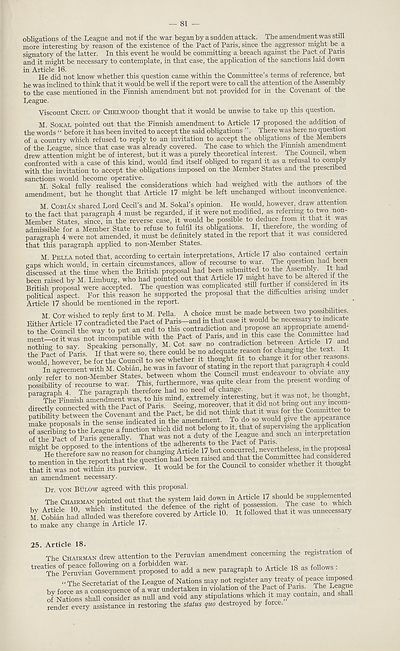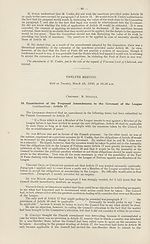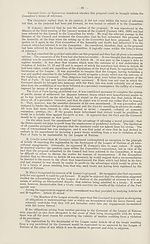Legal > Committee for the amendment of the Covenant of the League of Nations in order to bring it into harmony with the pact of Paris
(85)
Download files
Complete book:
Individual page:
Thumbnail gallery: Grid view | List view

— 81 —
obligations of the League and not if the war began by a sudden attack. The amendment was still
more interesting by reason of the existence of the Pact of Paris, since the aggressor might be a
signatory of the latter. In this event he would be committing a breach against the Pact of Paris
and it might be necessary to contemplate, in that case, the application of the sanctions laid down
in Article 16. ^ . , . , ,
He did not know whether this question came within the Committee s terms of reference, but
he was inclined to think that it would be well if the report were to call the attention of the Assembly
to the case mentioned in the Finnish amendment but not provided for in the Covenant of the
League.
Viscount Cecii, of Cheiavood thought that it would be unwise to take up this question.
M. Sokae pointed out that the Finnish amendment to Article 17 proposed the addition of
the words “ before it has been invited to accept the said obligations There was here no question
of a country which refused to reply to an invitation to accept the obligations of the Members
of the League, since that case was already covered. The case to which the Finnish amendment
drew attention might be of interest, but it was a purely theoretical interest. The Council, when
confronted with a case of this kind, would find itself obliged to regard it as a refusal to comply
with the invitation to accept the obligations imposed on the Member States and the prescribed
sanctions would become operative. > . , , . , ^ ,, f
M Sokal fully realised the considerations which had weighed with the authors or tne
amendment, but he thought that Article 17 might be left unchanged without inconvenience.
M. Cobian shared Lord Cecil’s and M. Sokal’s opinion. He would, however, draw attention
to the fact that paragraph 4 must be regarded, if it were not modified, as referring to two non-
Member States, since, in the reverse case, it would be possible to deduce from it that it was
admissible for a Member State to refuse to fulfil its obligations. If, therefore the wording of
paragraph 4 were not amended, it must be definitely stated in the report that it was considered
that this paragraph applied to non-Member States.
M. PELEA noted that, according to certain interpretations, Article 17 also contained certain
gaps which would, in certain circumstances, allow of recourse to war. The question ha-d been
discussed at the time when the British proposal had been submitted to the Assembly tt had
been raised by M. Limburg, who had pointed out that Article 17 might have to be altered f
British proposal were accepted. The question was complicated still further if considered m
political aspect. For this reason he supported the proposal that the difficulties arising under
Article 17 should be mentioned in the report.
M Cot wished to reply first to M. Pella. A choice must be made between two possibilities.
Either Article 17 contradicted the Pact of Paris—and in that case it would oe necessary to indicate
to the Council the way to put an end to this contradiction and propose an appropriate amend¬
ment-^ it was not incompatible with the Pact of Paris, and m this case the Committee had
nothing to say. Speaking personally, M. Cot saw no contradiction between Article 17 and
thp Pact of Paris If that were so, there could be no adequate reason for changing Lie text,
would however be for the Council to see whether it thought fit to change it for other reasons^
In agreement with M. Cobian, he was in favour of stating m the report that paragraph 4 could
onlv refer to non-Member States, between whom the Council must endeavour to obviate any
possibility of recourse to war. This, furthermore, was quite clear from the present wording of
naravraoh 4 The paragraph therefore had no need of change. ,, 1 i.
P The Finnish amendment was, to his mind, extremely interesting, but it was not he thought,
.. « f fUp Pact of Paris Seeing, moreover, that it did not bring out any mcom-
make proposais m function which did not belong to it, that of supervising the application
of thTpact ITpar^generaUy^That was not * duf of ^ an interpretation
might be opposed to the “°ns
He therefore saw no ~ °r chTO Arti^ 17 but e^ ^^
Its puS It would be for the Couneil to consider whether it thought
an amendment necessary.
Dr. von Bueow agreed with this proposal.
Ak®CHAmMA^.PniI^^.®nt^bat^hesyst(mi^laid^iowti^in^ Article JlT^shoiddaie^upplemented
My Cobidn had alluTed ^ therefore covered by Article 10. It followed that it was unnecessary
to make any change in Article 17.
25. Article 18.
The Chairman drew attention to the Peruvian amendment concerning the registration of
‘"^hVk^Ta"^ “eTtoadd a new paragraph to Article 18 as follows :
“The Secretariat of the League of Nations may not register ^ ^
Iw We as a consequence of a war undertaken m violation of the Pact of Pans The league
^ Nations shall consider as null and void any stipulations which it may contain, and s a
render every assistance in restoring the status quo destroyed by force.
obligations of the League and not if the war began by a sudden attack. The amendment was still
more interesting by reason of the existence of the Pact of Paris, since the aggressor might be a
signatory of the latter. In this event he would be committing a breach against the Pact of Paris
and it might be necessary to contemplate, in that case, the application of the sanctions laid down
in Article 16. ^ . , . , ,
He did not know whether this question came within the Committee s terms of reference, but
he was inclined to think that it would be well if the report were to call the attention of the Assembly
to the case mentioned in the Finnish amendment but not provided for in the Covenant of the
League.
Viscount Cecii, of Cheiavood thought that it would be unwise to take up this question.
M. Sokae pointed out that the Finnish amendment to Article 17 proposed the addition of
the words “ before it has been invited to accept the said obligations There was here no question
of a country which refused to reply to an invitation to accept the obligations of the Members
of the League, since that case was already covered. The case to which the Finnish amendment
drew attention might be of interest, but it was a purely theoretical interest. The Council, when
confronted with a case of this kind, would find itself obliged to regard it as a refusal to comply
with the invitation to accept the obligations imposed on the Member States and the prescribed
sanctions would become operative. > . , , . , ^ ,, f
M Sokal fully realised the considerations which had weighed with the authors or tne
amendment, but he thought that Article 17 might be left unchanged without inconvenience.
M. Cobian shared Lord Cecil’s and M. Sokal’s opinion. He would, however, draw attention
to the fact that paragraph 4 must be regarded, if it were not modified, as referring to two non-
Member States, since, in the reverse case, it would be possible to deduce from it that it was
admissible for a Member State to refuse to fulfil its obligations. If, therefore the wording of
paragraph 4 were not amended, it must be definitely stated in the report that it was considered
that this paragraph applied to non-Member States.
M. PELEA noted that, according to certain interpretations, Article 17 also contained certain
gaps which would, in certain circumstances, allow of recourse to war. The question ha-d been
discussed at the time when the British proposal had been submitted to the Assembly tt had
been raised by M. Limburg, who had pointed out that Article 17 might have to be altered f
British proposal were accepted. The question was complicated still further if considered m
political aspect. For this reason he supported the proposal that the difficulties arising under
Article 17 should be mentioned in the report.
M Cot wished to reply first to M. Pella. A choice must be made between two possibilities.
Either Article 17 contradicted the Pact of Paris—and in that case it would oe necessary to indicate
to the Council the way to put an end to this contradiction and propose an appropriate amend¬
ment-^ it was not incompatible with the Pact of Paris, and m this case the Committee had
nothing to say. Speaking personally, M. Cot saw no contradiction between Article 17 and
thp Pact of Paris If that were so, there could be no adequate reason for changing Lie text,
would however be for the Council to see whether it thought fit to change it for other reasons^
In agreement with M. Cobian, he was in favour of stating m the report that paragraph 4 could
onlv refer to non-Member States, between whom the Council must endeavour to obviate any
possibility of recourse to war. This, furthermore, was quite clear from the present wording of
naravraoh 4 The paragraph therefore had no need of change. ,, 1 i.
P The Finnish amendment was, to his mind, extremely interesting, but it was not he thought,
.. « f fUp Pact of Paris Seeing, moreover, that it did not bring out any mcom-
make proposais m function which did not belong to it, that of supervising the application
of thTpact ITpar^generaUy^That was not * duf of ^ an interpretation
might be opposed to the “°ns
He therefore saw no ~ °r chTO Arti^ 17 but e^ ^^
Its puS It would be for the Couneil to consider whether it thought
an amendment necessary.
Dr. von Bueow agreed with this proposal.
Ak®CHAmMA^.PniI^^.®nt^bat^hesyst(mi^laid^iowti^in^ Article JlT^shoiddaie^upplemented
My Cobidn had alluTed ^ therefore covered by Article 10. It followed that it was unnecessary
to make any change in Article 17.
25. Article 18.
The Chairman drew attention to the Peruvian amendment concerning the registration of
‘"^hVk^Ta"^ “eTtoadd a new paragraph to Article 18 as follows :
“The Secretariat of the League of Nations may not register ^ ^
Iw We as a consequence of a war undertaken m violation of the Pact of Pans The league
^ Nations shall consider as null and void any stipulations which it may contain, and s a
render every assistance in restoring the status quo destroyed by force.
Set display mode to:
![]() Universal Viewer |
Universal Viewer | ![]() Mirador |
Large image | Transcription
Mirador |
Large image | Transcription
Images and transcriptions on this page, including medium image downloads, may be used under the Creative Commons Attribution 4.0 International Licence unless otherwise stated. ![]()
| League of Nations > Legal > Committee for the amendment of the Covenant of the League of Nations in order to bring it into harmony with the pact of Paris > (85) |
|---|
| Permanent URL | https://digital.nls.uk/191509917 |
|---|
| Shelfmark | LN.V |
|---|
| Description | Over 1,200 documents from the non-political organs of the League of Nations that dealt with health, disarmament, economic and financial matters for the duration of the League (1919-1945). Also online are statistical bulletins, essential facts, and an overview of the League by the first Secretary General, Sir Eric Drummond. These items are part of the Official Publications collection at the National Library of Scotland. |
|---|---|
| Additional NLS resources: |
|

